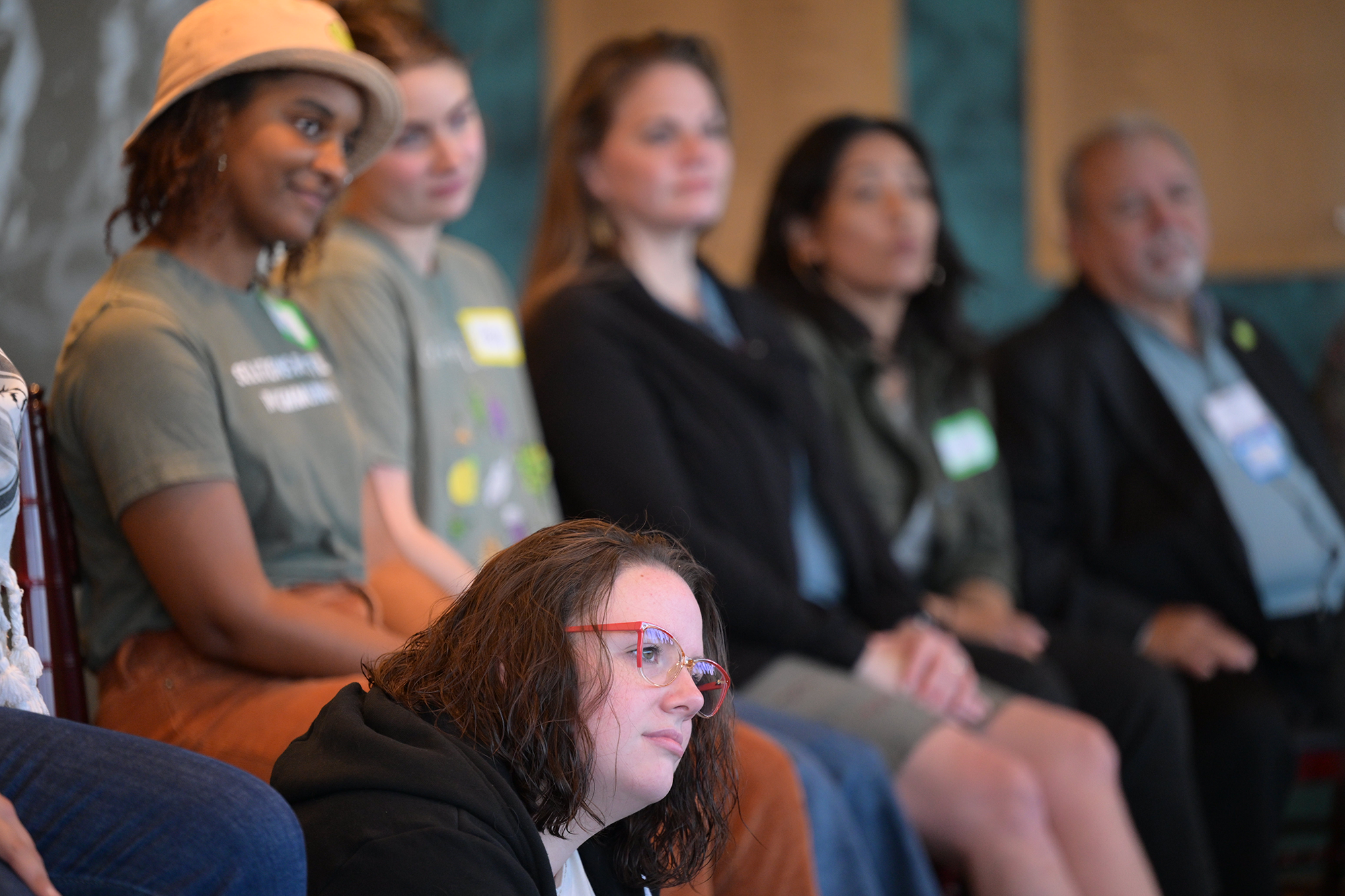
In a new issue of the Principle 6 Newsletter, republished below, Mike Mercer urges credit unions—and cooperatives—to consider their role in addressing the tension between personal freedom and collective well-being. While credit unions didn’t cause inequality, they are nonetheless a reflection of American society, the former president and CEO of Georgia Credit Union Affiliates and 2020 inductee to the Cooperative Hall of Fame writes. “What if credit unions and cooperatives determined to be beacons of enlightenment in the market?” he asks.
Read the full issue of Principle 6 Newsletter below. And while you’re thinking about “cooperation among cooperatives,” take a moment to consider how you and your cooperative practice this principle. NCBA CLUSA is on a mission to document Principle 6 collaborations across the country so we can identify trends, document best practices and share this knowledge with you—our fellow cooperators!
Share your example of Principle 6
Principle 6 Newsletter – Can ‘Me’ and ‘We’ Coexist?
Issue 8 – October 28, 2020
The United States has one of the most individualistic cultures in the world. Americans are more likely to prioritize themselves over a group and they value independence and autonomy. – Brown Political Review, 10-31-18
In a world of increasing complexity and interdependence, we can no longer afford “to go our own way.” Rather, we need to exercise our capacity for developing institutions that recognize our interconnectedness, moving toward the creation of “the good society,” “where the common good is the pursuit of the good in common.” – Andree and Velasquez, “Creating the Good Society,” Santa Clara University
In the 2018 midterm elections, female candidates began to articulate a new version of the country to replace the old American paradox (ie: universal equality, but only for white male property-holders). They emphasized community and fairness over individualism and the race, class, and gender roles individualism has always implied. – Heather Cox Richardson, “How the South Won the Civil War,” 2020 (with clarification)

Individualism is regarded as the engine of capitalism… the market economy. Without the incentives of individual financial reward, the thinking goes, innovation and productivity improvements would be harder to come by. Exploration and creativity are propelled by individual initiative. Competition and ends-justify-the-means behaviors are (within reason) worthy of emulation. Self-initiative and self-reliance are regarded to be admirable traits in American society.
But, increasingly, individualism has become a dirty word, accompanied by adjectives like selfishness, hubris, unwillingness to compromise. “I have a right to do what I want, community/society be damned.” “Don’t tell me that I have to wear a mask!” Personal freedom is cool… until it deprives others of their freedoms. The concentration (and abuse) of wealth in business or power in government are considered the ultimate manifestations of excessive individualism.
Our culture of individualism has deep roots. Certain inalienable rights. Rejection of monarchy. Pursuit of life, liberty and property (property was replaced by happiness in the final draft of the Declaration). Darwin’s theory on survival of the fittest. The lone cowboy, surviving in a hostile frontier. But, too often, the theory is blemished by practice that elevates and preserves the superiority of one group above all others. Some even suggest that individualism, left unchecked, will always lead to race, gender and class stratification.
There are elements of individualism in the credit union universe that deserve self-reflection. Decision-making autocracy is occasionally concentrated in the CEO’s office, supported by “rubber stamp” concurrence from elected officials and executed without modification by loyal subordinates. It is then when the language becomes dominated by expressions like “my credit union,” “my staff,” “my plan,” etc. A credit union official once told me in all seriousness, “the best form of governance is benevolent dictatorship.” In this frame of mind, a CU leader is not usually inclined to participate in cooperative venture with other CUs or put a shoulder to advocacy work at the state or national level. He or she would likely consider the cooperative principles to be unproductive folklore.
BTW, excessive individualism is not a foreign practice at the state and national support organizations. Opting out or competing against system collaboration is a “right” that gets exercised often. The credit union system is a reflection of American society… a constant struggle between independent, my domain decision-making and collaborative “system” solution development. There will always be tension between the freedom to do what I want and the responsibility for the well-being of the whole. As cooperatives, it is not unreasonable to expect greater sensitivity to excessive individualism… at least relative to the for-profit providers.
Rather than chastising each other inside the system (our usual unfulfilling practice), what if we turned our “do something about excess individualism” energies outside… to the society that we live in? What if credit unions and co-ops determined to become beacons of enlightenment (and better differentiated) in the market? Consider a couple of possibilities…
Family Financial Security is at the root of income/wealth disparity concerns in our society. Americans don’t worry too much that LaBron James can buy a yacht with cash. But they are painfully concerned about the inability to pay bills and accomplish the things that come along in life… for themselves, for their family members and for close friends. Credit unions do wonderful work to help a meaningful chunk of the more than 100 million members contend with their financial challenges. But that help takes place in thousands of small daily interactions, largely invisible and drastically underappreciated at the societal level.
Suppose credit unions set aside individual initiative to participate in a system-wide collaboration designed to bring visibility and acclaim to a much deserving group of cooperative organizations. This initiative would not be a shotgun approach. It would focus on one segment and just one or two of their financial challenges in life. The infrastructure to make it happen would be housed in a massive collaboration, employing the best techniques and talent available.
For example, what if the entire credit union system was to participate in a nation-wide “First Car, First House” campaign for young people? “Let credit unions help you get started in life. You can go to your credit union… or go to the ‘First Car’ (or ‘First House’) website…or, download the First Car-First House app.” Let your minds wander. Let smarter people than this author design the program. The key thing… credit unions visibly and convincingly solve a family financial security problem or two facing Americans by working together.
Gender/Race/Caste Inequity and Injustice have exposed American democracy and its Jeffersonian cornerstone of individual freedom to relentless and justifiable cynicism for more than two centuries. The struggle to live up to the promise of universal equality—in opportunity, in representation, in dignity—has been long, hard and often violent. Today, finally, any citizen can vote, at least according to the laws of the land. And, some progress has been made in assuring that any citizen can improve his or her lot in life. But there is much left to do. Privileges of caste remain. Inequity and injustice are still too often present in daily life.
Credit unions didn’t cause these conditions to exist. In fact, they were born in response to inadequate opportunity for working folks, no matter their wealth or circumstance. However, credit unions are part of American society. Leadership opportunity came easier to those unburdened with the inequities of privilege. Credit unions and their support organizations have pledged to oppose injustice and to achieve equality in opportunity. The new DEI Collective has been formed to bring attention to the responsibility credit unions have in making tangible progress. Thought Framers should encourage every credit union and all support companies to embrace the DEI Collective pledge. At least that’s a start.
But there should be higher aspirations. Suppose the DEI Collective created a certification process that would be deliberately visible to all consumers? It would go way beyond the well-intentioned promises to do better, usually published in the monthly newsletter and posted on the website. Meet the criteria and fly the flag!
What if the American Credit Union DEI Certification included, among other things, commitments to accomplish the following:
- By 2030 or sooner, the composition of CU leadership (board and C-suite) will embrace gender and ethnicity that reflects the CU membership
- By 2030 or sooner, the composition of the membership will have the gender and ethnicity characteristics of the communities and groups served by the CU.
- The credit union will provide service in the predominant second language of the membership when the proportion of members speaking the second language exceeds 10 percent of the total.
Somebody will come up with a better list of criteria. But just imagine the lucrative market differentiation that could be achieved if credit unions set aside individualism to accomplish this kind of initiative! Not just saying it (certification), but getting it done. I know… ridiculous idea, it’ll never happen, not everybody would play. What if 90 percent participate? What about 75 percent? What if it was connected to ‘Open Your Eyes to a Credit Union’?
These are just two ways that Thought Framers could propose piercing the excess individualism balloon by aiming collective initiative outside the walls of “my domain.” There are certainly others. Without 100 percent participation, credit unions raised 9 figures for the Children’s Miracle Network. The credit union system got 100 percent credit. And, CUNA Chairman Tom Dority got a lipstick kiss on the forehead from Marie Osmond!
There is plenty of cooperative DNA in the system to unite effort again. Who will lead the uniting?
Maybe ‘Me’ and ‘We’ can coexist…
Stay tuned,
Mike


